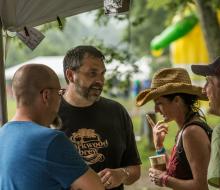emergent christianity

We’re headed home from Wild Goose Festival, a gathering of artists, activists, musicians, and theologians, in Hot Springs, N.C. It was hot, rainy, and messy. My suitcase smells like my fifth grade gym locker.
I can’t wait to go back next year.
The speakers are remarkable; many of them are walking the talk they’re offering, which is an unfortunately rare phenomenon. The music is fresh and exciting, the art is created before your eyes, and there is an energy of hopeful expectation that renews your soul, flushing out the broken-down-ness of daily life.
But the most important part of the whole four-day event lies in the unexpected moments. Sometimes I would walk along the main dirt road in the middle of the grounds, lined with tables, tents, and makeshift gathering spaces, until I saw something interesting going on and just joined in.
In one moment you’re debating the theological implications of the American food-industrial complex. Half an hour later, you’re laughing with new friends in the beer tent. And then, just when the sun sets and you’re sure you lack the fortitude to go one any more, the music on the main stage cranks up and the very earth beneath you vibrates.

I can’t count how many times I’ve heard people within mainline Christian churches note that, though they don’t embrace all of the theological positions of their evangelical sisters and brothers, they are impressed by their aptitude for organizing and affecting change on a large scale. At the same time, I see thousands converge at festivals like the Wild Goose festival in North Carolina, feeling both fed by the invigorating sense of community, but also frustrated to be leaving with the still unanswered question:
What do we do now?
The CANA Initiative, which is a joint collaboration of Brian McLaren, Stephanie Spellers, and Doug Pagitt, seeks to help answer that nagging question. Cana seeks to be the connective tissue that helps hold together communities of faith that share common priorities in addressing the pressing socioeconomic issues of our time.
From their website, “The CANA Initiative brings together innovative leaders from all streams of the faith to collaborate in the development of new ways of being Christian ... new ways of doing theology and living biblically, new understandings and practices of mission, new kinds of faith communities, new approaches to worship and spiritual formation, new integrations and conversations and convergences and dreams.”
Following is an audio interview I conducted with these three key voices in the CANA conversation. We talked about why CANA is needed now, more than ever, and what sort of transformation they hope to affect within the greater Christian body.

Eric Elnes, author of Phoenix Affirmations: A New Vision for the Future of the Christian Faith and Asphalt Jesus, always has something brewing. I sat down with him over a hearty cup of his own Darkwood Brew coffee at the recent Wild Goose Festival in North Carolina to find out more about Convergence Christianity, a new concept he’s developing, and which is gaining traction across many traditional ideological and theological lines.
Here’s what Eric had to say about the current state of the Christian faith, as well as where he sees it heading.

I’ve experienced some strange extremes lately. First, I attended – and spoke at – the Subverting the Norm conference in Springfield, Mo., where we took some time to consider how, if at all, so-called “radical theology” could exist within today’s religious systems. Then I got home and found my latest TIME Magazine, with a cover story titled “The Latino Reformation,” which reveals what most within Protestantism have known for some time: formerly Catholic Latino Christians are dramatically reshaping the face of the American Christian landscape.
Interestingly, there is little-to-no overlap between these two groups – a point which was made clear to me by the fact that there were very few people of color in attendance at Subverting the Norm. One comment, from an African-American woman who was there, was that the very focus of the conference (on academic, esoteric questions of theology and philosophy) assumed the kind of privilege still dominated by middle-class white males. Put another way: while we’re busy navel-gazing and discussing the meaning of Nietzsche’s “death of God,” non-Anglo religious leaders were busy dealing with real-world problems right in front of them.